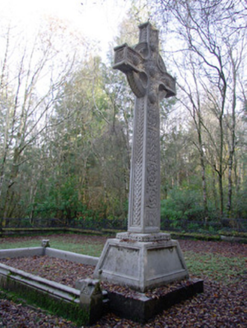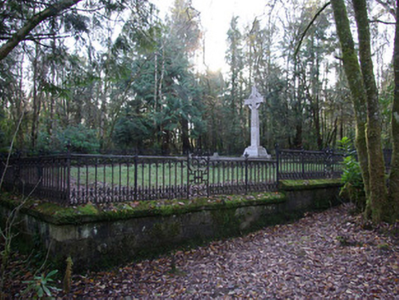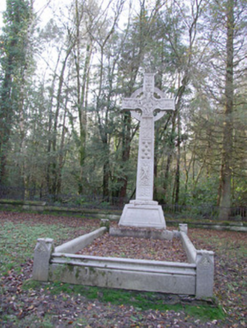Survey Data
Reg No
40909416
Rating
Regional
Categories of Special Interest
Architectural, Artistic, Historical
Previous Name
Lough Eske Castle
Original Use
Monument
In Use As
Graveyard/cemetery
Date
1900 - 1910
Coordinates
196207, 382357
Date Recorded
07/11/2007
Date Updated
--/--/--
Description
Celtic high cross-style memorial gravemarker, dated 1906, comprising carved limestone Celtic high cross over splayed limestone base/plinth. Commemorates Major General Henry George White of nearby Lough Eske Castle (see 40909401). Celtic interlacing to all faces; carved figures in bas relief to principal face; inscription to plinth to base. Grave itself surrounded by low limestone plinth wall with decorative finials with Celtic interlacing motifs to the corners. Site surrounded by low ashlar plinth wall on rectangular-plan having chamfered ashlar coping over and with decorative wrought-iron railings over. Gateway to site having wrought-iron double-gates having plaques with pelican and inscription ‘Beware in Time’, and another with inscription ‘Virtus Semper Vincit. Located to the east of Lough Eske Castle close to the shores of Lough Eske.
Appraisal
This very fine Celtic high cross monument is a sculptural/artistic work of very high quality with rich Celtic interlacing motifs throughout and with intricate carved figures to the principal face. It was erected c. 1906 to mark the final resting place of Major General Henry George White (1835 – 1906) who owned and lived at nearby Lough Eske Castle (see 40909401) from 1894 until his death. Major General White had a distinguished career in the British Army serving at the Crimean War (1854-56), in the Indian Mutiny (1858-59), in Cyprus (1878-79) and Bechanaland in South Africa in the 1880s. The use of a Celtic high cross is perhaps an unusual choice for a Major General in the British Army. The good-quality ashlar boundary wall and the delicate wrought-iron railings over add significantly to the setting and are works of some artistic merit in their own right. The gateway has two plaques, one of which displays a pelican (a symbol of mortality) and the inscription ‘Beware of Time’, and the other bears the inscription ‘Virtus Semper Vincit’ (Virtue Always Conquers), perhaps an appropriate epitaph for a retired army General. This monument forms an integral element of a group of structures related with Lough Eske Castle, and is a significant element of the built heritage of the local area in its own right.





